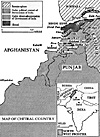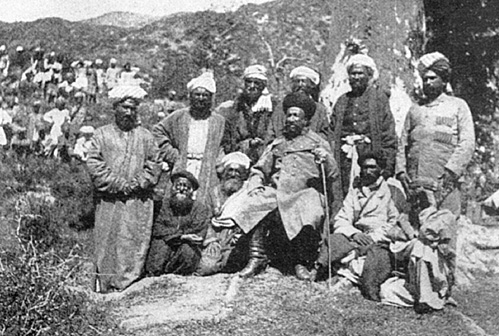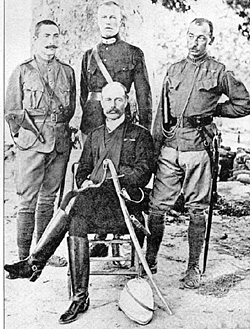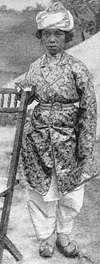INTRODUCTION
0n the 30th August 1892 'The Great Mehtar" ruler of Chitral, Aman-ul-Mulk died of a heart attack. It was fairly unusually for anyone of importance to die of natural causes in Chitral, although unfounded rumours of poisoning abounded. He had ruled for some 33 years and had been, to say the least, a harsh leader responsible for many murders to remain in power. To his credit he had held the many tribal groups and factions of Chitral together for all that time as an independent state, this being no easy task with so many larger countries surrounding it (see map).
 Map of Chitral Country
Map of Chitral Country
Map of Chitral Country Large (slow: 107K)
Britain's view towards Chitral was that of a buffer state on India's border. In 1876 Afghanistan threatened to invade and Aman-ul-Mulk sought Kashmir's protection, to which Britain readily agreed and Chitral then became a subject state to Kashmir, watched over by India.
The Mehtar had previously made an approach to the Emir of Afghanistan about becoming a subject state to him, when he was worried about an earlier invasion threat, but nothing was to come from this.
This manoeuvering by the Mehtar showed him to be a cunning ruler, willing to bend with the wind to secure his own independence and his right to rule.
Due to his bloody rule, his death did not bring any mass grieving on the part of his people or relatives.
He left behind many children and it was his two sons - Nizam and Afzul - who became the two main protagonists for the throne. Fortunately for Afzul he was positioned at the Chitral palace (fort) and from there he sent word to India begging for recognition as the new Mehtar and for a British officer to be sent to further support his claim.
India granted both requests and Afzul was so recognised and a officer was dispatched to complete the formalities. His reign as Mehtar was somewhat short lived; he was killed by followers of another claimant to the throne, an exiled Chitral prince named Sher-Afzul who was favoured by the Emir of Afghanistan. This would-be ruler himself fled the palace upon the approach of Nizam and his followers.
Nizam, having won an all-to-easy victory, claimed himself as the true Mehtar and, as his brother had previously done, sent urgent deputations to India for full recognition and for a British officer to be sent.
 Sher Aftul and his Attendants
Sher Aftul and his Attendants
So in 1893 a British Officer, Surgeon Dr. George Scott Robertson the then Anglo-Indian Administrator set off with fifty Sikhs and three officers to meet the new ruler of Chitral. Upon their arrival they found an uneasy situation - a frightened and confused Nizam and large bands of armed tribesmen camped around the palace and surrounding areas, none of whom seemed pleased with their presence.
Fortunately, due to true British diplomacy on the part of Major Robertson and his officers and the displaying of his Sikhs marksmanship and willingness on all parts to be friendly towards the Chitralis, the British. force was accepted as comrades (partly due to the reputation of the Sikhs potential fighting skills and unwillingness to suffer their wrath).
Many months were to be spent securing Nizam upon the throne and strengthening his position as rightful Mehtar through negotiations with the leaders and elders from all over the country. With this task accomplished as best as could be expected, Major Robertson and his force returned to Gilgit with a Lt. Gurden and eight Sikhs being dispatched to Chitral as Political Agent, arriving in December of 1893.
It was felt that Nizam would be able to rule the country providing Sher-Afzul could be kept in check (he having returned to Khabul in Afghanistan) and that Umra Khan (the late Aman-ul-Mulk's son-in-law who had a large following in Chitral) did not claim the throne for himself. With these concerns in mind, Nizam was recognised as the Mehtar of Chitral with the support of the Indian government.
THE MEHTAR IS DEAD!
LONG LIVE THE MEHTAR
For a short while all seemed well, with no further disturbances of note until January 1895 when news came of Nizam's death by a supposed shooting accident. The truth being he had been murdered by a follower of his half-brother Amir-ul-Mulk on the 1st January - who now immediately claimed himself Mehtar. He was regarded to be somewhat backward in nature, although this may have been an exaggerated appearance of his behalf so as not be regarded as a threat to anyone, not a bad thing to have achieved judging by the rate of assassinations carried out in the country.
The plan was for Amir-ul-Mulk to step down as Mehtar and hand over the throne to SherAfzul who was to be supported by Umra Khan with promises of part of Chitral to rule over. As is usual the new ruler soon changed his mind, influenced in some part by his only slighter older advisers, slightly because the true older and no doubt wiser elders and advisers had stood back to await developments. Amir-ul-Mulk saw a chance for himself to become the true ruler of Chitral and started to entreat Lt. Gurdon to recognise him as such.
Lt. Gurdon and his small escort were in real danger, with again growing animosity towards them and a uncertain atmosphere in the air. Once again by use of the British bold front, stiff upper lip and clever use of his sikhs in always being together, Amir-ul-Mulk saw the British Party as an asset to his claim and tensions were eased. He even allowed the escort of sikhs to be increased by a further fifty, travelling from the only fort anywhere near Fort Mastuj.
 K. HARLEY, B.E.M. GURDON, C.V. F. TOWNSHEND, and (seated) G.S. ROBERTSON
K. HARLEY, B.E.M. GURDON, C.V. F. TOWNSHEND, and (seated) G.S. ROBERTSON
As was usual practice the new pretender started murdering anyone who might appose him, but fortunately for some, Lt. Gurdon managed to put a stop to this, sighting the Indian governments displeasure. He stated that he alone could not recognise him as the rightful Mehtar and that it was up to the Indian government and accordingly dispatches were sent, along with the Lt's. own intelligence.
For their part the Indian government was not about to recognise some young upstart assassin, especially one thought to be less than normal in state of mind. So again, Major Robertson was ordered to the palace to ascertain the situation on the spot, this time accompanied by a much larger force. They arrived on the 31st January to be greeted by a much relieved Lt. Gurdon, the march having been extremely arduous over very poor roads and with the winter snows starting to fall, any further marches would be even more hazardous.
The troops set about securing a safe position in some houses outside the fort and in reconnoitring the fort and surrounding areas. Further supplies were secured from the limited amount available, Lt. Gurdon having done sterling work in already gathering a large quantity.
Bad Situation
The situation had deteriorated badly since Major Robertson had set off, with Umra Khan having invaded Chitral with a large force, initially under the pretext of attacking a neighbouring province but it soon became clear he was making for the palace. Fortunately for all, his advance had been checked at the fort Kila Drosh some thirty miles away. A good strong mountain defence position at Gairat had been garrisoned by Chitral tribesmen loyal to Amir-ul-Mulk some sixteen miles from the palace, so any further advance by Umra Khan looked unlikely.
Amir-ul-Mulk himself was not at the palace to greet the Major, but was at Gairat, he had left his little brother Shujr-ul-Mulk to represent him. Despite offers of negotiations he refused to return to the palace. Even when a detachment of troops were sent to Gairat to stiffen the defence and with the Major visiting him in person the would be Mehtar still refused to return to the palace for talks.
The situation now took a definite down turn for the now somewhat isolated British lead force. Sher-Afzul had secretly returned to Chitral and apparently renewed his old alliance with Umra Khan. This at first seemed good news to the British as Sher-Afzul would make a better Mehtar and was popular amongst a large portion of the population. Alas he sent word that the British were to leave the fort (the British had moved into it due to the worsening situation) and march back to Mastuj, if needs must the major and a escort of sixteen men could remain camped outside the fort, but no further British Officers Could remain in the country.
 Shuja-ul-Mulk, the new MEHTAR of CHITRAL
Shuja-ul-Mulk, the new MEHTAR of CHITRAL
If these demands were met he would be the friend of the government of India, providing a subsidy was paid to him.
The demands were totally rejected and somewhat unexpected in their potential hostility, and due to this the need to withdraw all outlying troops back into the fort became of paramount importance. The detachment at Gairat was virtually alone, with all the Chitralis having deserted their posts to fall in with Sher-Afzul and the fort at Kila Drosh having fallen to Umra Khan due to treachery by part of its garrison.
By March 2nd all troops had successfully returned back to the fort and preparation were underway to put the fort into readiness to repel an attack. Amir-ul-Mulk had also returned to his palace to find it now garrisoned by the British and immediately began to implore the Major to agree to Sher-Afzul's demands with the hope of saving his own life.
The Major, now with the situation deteriorating all around him on the diplomatic front, declared the young Shuja-ul-Mulk as Mehtar, upon approval of the Indian government. This certainly had the effect of quietening things down at the palace and due homage was paid to the boy ruler by the elders present and even by Amir-ul-Mulk himself, paying tribute to his young brother.
Back to Colonial Conquest Issue 3 Table of Contents
Back to Colonial Conquest List of Issues
Back to MagWeb Master List of Magazines
© Copyright 1993 by Partizan Press.
This article appears in MagWeb (Magazine Web) on the Internet World Wide Web.
Other military history articles and gaming articles are available at http://www.magweb.com